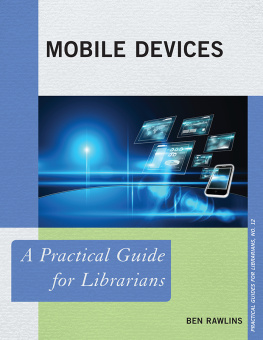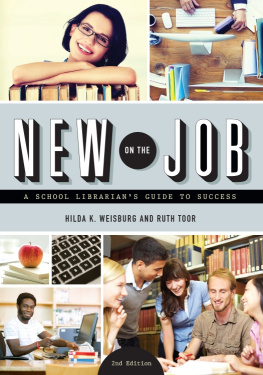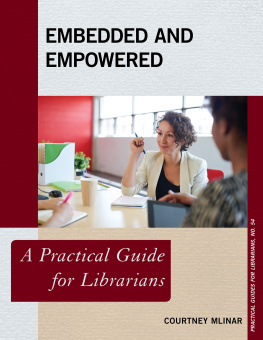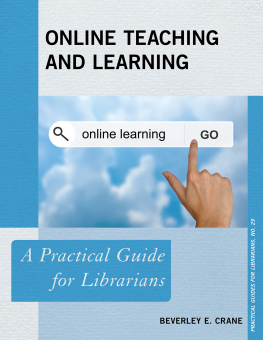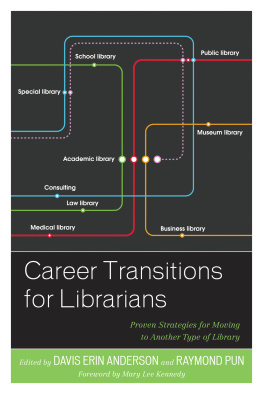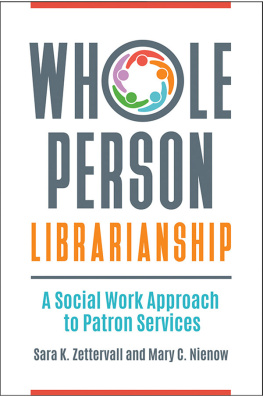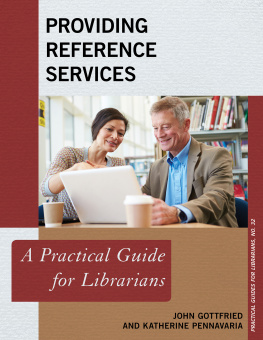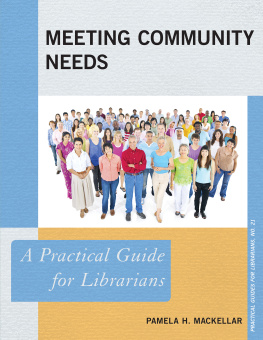Drawing on the authors own experiences, as well as surveys and interviews conducted with those working in different types of libraries, the book will provide librarians with a field guide for surviving and thriving in their new environment. It will do so by making suggestions for how librarians can orient themselves to their new library, add context to their CV or rsum, get started with presenting and publishing, and manage culture shock and emotions. Each chapter will also provide the opportunity for the librarian to reflect on relevant aspects of their own situation and move forward with the help of action items.
For more information about this series, please visit: www.routledge.com/Routledge-Guides-to-Practice-in-Libraries-Archives-and-Information-Science/book-series/RGPLAIS
Guidance for Librarians Transitioning to a New Environment
Tina Herman Buck and Sara Duff

First published 2021
by Routledge
2 Park Square, Milton Park, Abingdon, Oxon OX14 4RN
and by Routledge
52 Vanderbilt Avenue, New York, NY 10017
Routledge is an imprint of the Taylor & Francis Group, an informa business
2021 Tina Herman Buck and Sara Duff
The right of Tina Herman Buck and Sara Duff to be identified as authors of this work has been asserted by them in accordance with sections 77 and 78 of the Copyright, Designs and Patents Act 1988.
All rights reserved. No part of this book may be reprinted or reproduced or utilised in any form or by any electronic, mechanical, or other means, now known or hereafter invented, including photocopying and recording, or in any information storage or retrieval system, without permission in writing from the publishers.
Trademark notice: Product or corporate names may be trademarks or registered trademarks, and are used only for identification and explanation without intent to infringe.
British Library Cataloguing-in-Publication Data
A catalogue record for this book is available from the British Library
Library of Congress Cataloging-in-Publication Data
A catalog record has been requested for this book
ISBN: 978-0-367-19903-6 (hbk)
ISBN: 978-0-367-19906-7 (pbk)
ISBN: 978-0-429-24399-8 (ebk)
Typeset in Times New Roman
by Newgen Publishing UK
Contents
Both authors have gone through significant library transitions, moving between types and sizes of libraries. We both realized independently that there is very little information or advice on the market for librarians who want to make this kind of big change effectively and efficiently. We started talking to each other about this topic in the midst of Saras transition to the University of Central Florida and realized that if we had these experiences and frustrations, surely others would as well. We thought of what we wish people had told us before we switched, and new things we tried that worked, and decided to put them all together in this book. But it wasnt enough to lean only on our experiences. We wanted to make sure we werent isolated cases, so we put out a call on email lists and message boards in various countries. In the end, we interviewed 23 librarians who have worked in a wide variety of library environments and wove quotes from those interviews throughout this book, credited to those librarians.
As we began writing the book and talking to librarians, there was a near universal response. Virtually everyone we spoke to said something to the effect of, Im so glad youre writing this! People echoed our view that this has been a gap in the library literature, and that they themselves had wished for something like this.
This book is taken from our experiences and research. Our goal has been to offer support and encouragement for librarians in transition but not everything on offer here will work for every situation a librarian might find themselves in. We encourage you to consider everything in the book, bypass those strategies that arent appealing or applicable to your situation, and partake of what is helpful to you. Please take from this wide array of ideas and advice as it suits you, with our best wishes for your success.
Before delving further, we would like to tell you our individual stories and why we wanted to write this book.
Saras story
I am the Acquisitions & Collection Assessment Librarian at the University of Central Florida. If you had told me eight years ago that I would end up at one of the largest research universities in the United States, I would not have believed it to be possible.
My first library conference was in the spring of 2009. I was a graduate student, full of energy and ideas, but didnt yet know where I would fit in the library profession. This was during the Great Recession, and finding a job was a pressing, seemingly impossible, issue. Almost every big school or library system had hiring freezes in place, and with no end yet in sight, people were tense.
With all this in mind, I went to a session about finding a library job. On the panel were library representatives from different types of libraries, including a large research university and a county-wide public library system. The room was packed, all seats were filled and people were standing in clumps around the perimeter. The discussion went on for a while, covering many aspects of the library job search, but the point that stood out to me the most then, and that I remember most clearly now, was about moving between library types. The representative from the research university library told the standing-room-only crowd in no uncertain terms that the type of library you started at would be the type of library you worked in for the rest of your career. He conceded that yes, some skills transfer, but that academic and public libraries were so different that his university never hired people from other library types. The public library representative then agreed with him! The exception, they both stated, was community college librarians. They got a taste of working with the public but still did academic librarian work, so therefore community college librarians alone could transfer between library types throughout their career. Hands shot up from mid-career librarians around the room and some heated discussion ensued, but the authorities at the front of the room did not budge.


